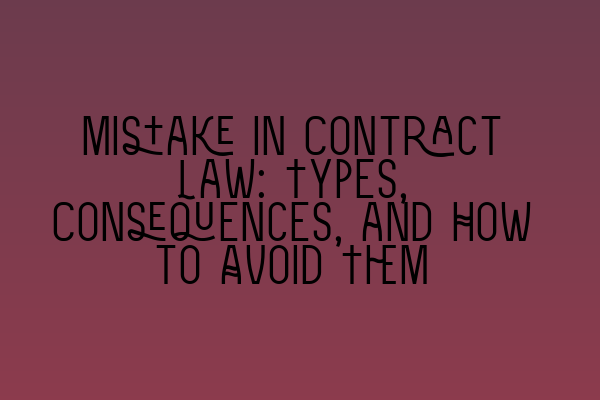Mistake in Contract Law: Types, Consequences, and How to Avoid Them
Welcome to the SQE Contract Law blog, where we provide valuable insights into various legal concepts. In this article, we will explore the topic of mistake in contract law, its different types, the potential consequences, and most importantly, how to avoid making costly mistakes in your contracts.
Before we dive in, if you’re preparing for the SQE 1 exam, make sure to check out our comprehensive SQE 1 Practice Exam Questions and SQE 1 Practice Mocks FLK1 FLK2 to enhance your understanding and test your knowledge.
Types of Mistake in Contract Law
Firstly, it’s important to understand the different types of mistakes that can occur in contract law:
- Mutual Mistake: This type of mistake occurs when both parties to a contract have an erroneous belief about a crucial fact related to the contract. For example, if two parties agree to purchase a property based on the mistaken belief that the property includes a separate parking lot.
- Unilateral Mistake: Unlike mutual mistake, unilateral mistake involves only one party being mistaken about a crucial fact. To make matters more complex, the mistaken party may still be bound by the contract unless certain criteria are met. For instance, if one party mistakenly types an incorrect quantity while entering into a contract to purchase goods, the contract may still be enforceable against them.
- Mistake as to Identity: This type of mistake occurs when one party is mistaken about the identity of the other party. If the mistaken party would not have entered into the contract had they known the true identity, they may be able to avoid the contract entirely.
Consequences of Mistake in Contract Law
Mistakes in contracts can have significant consequences for all parties involved. Some of the potential outcomes include:
- Voiding of the entire contract
- Rectification of the contract to correct the mistake
- Rescission of the contract, allowing the parties to be released from their obligations
- Damages to compensate the injured party for any losses suffered as a result of the mistake
How to Avoid Mistakes in Contracts
Preventing mistakes in contracts is crucial to ensure smooth business transactions and avoid potential legal disputes. Here are some tips to help you avoid making mistakes in your contracts:
- Double-Check all Information: Carefully review all the terms, conditions, and details of the contract to ensure accuracy. Take the time to verify important facts and figures with reliable sources.
- Seek Legal Advice: Consulting with a solicitor specializing in contract law can provide invaluable guidance to identify potential issues and ensure your contracts are legally sound.
- Put Everything in Writing: Documenting all agreements in a written contract helps prevent misunderstandings and provides clarity for both parties.
- Include Clear and Specific Terms: Clearly define key terms, conditions, and obligations to avoid ambiguity and potential misinterpretation.
- Perform Due Diligence: Conduct thorough research and investigations before entering into any contractual agreements. Know who you are dealing with and confirm the accuracy of any information provided.
If you’re preparing for the SQE 1 or the SQE 2 exam, we offer comprehensive preparation courses to help you succeed. Check out our SQE 2 Preparation Courses and SQE 1 Preparation Courses to enhance your legal knowledge and boost your chances of passing the exams.
Lastly, keep an eye on the SRA SQE Exam Dates to ensure you’re up-to-date with the latest information regarding the SQE exams.
We hope this article has provided valuable insights into the topic of mistake in contract law. By understanding the different types of mistakes, their consequences, and implementing strategies to avoid them, you can protect your interests and forge stronger contractual relationships.
